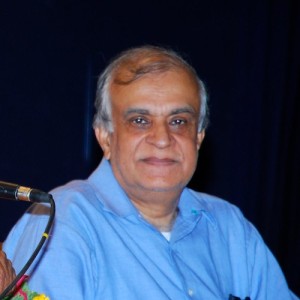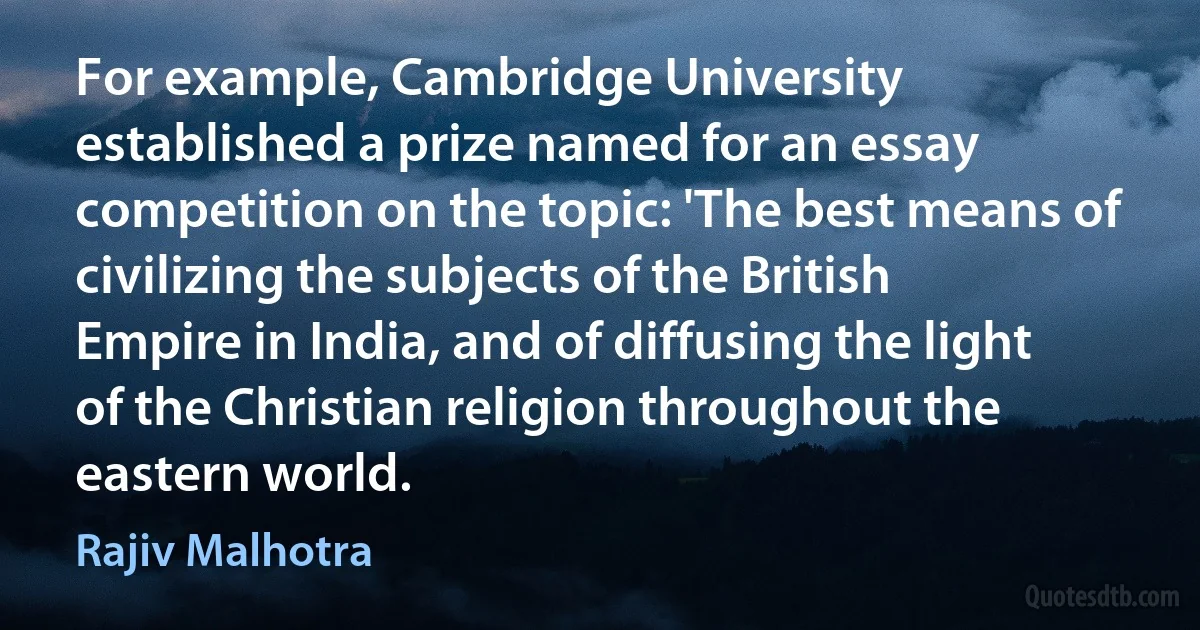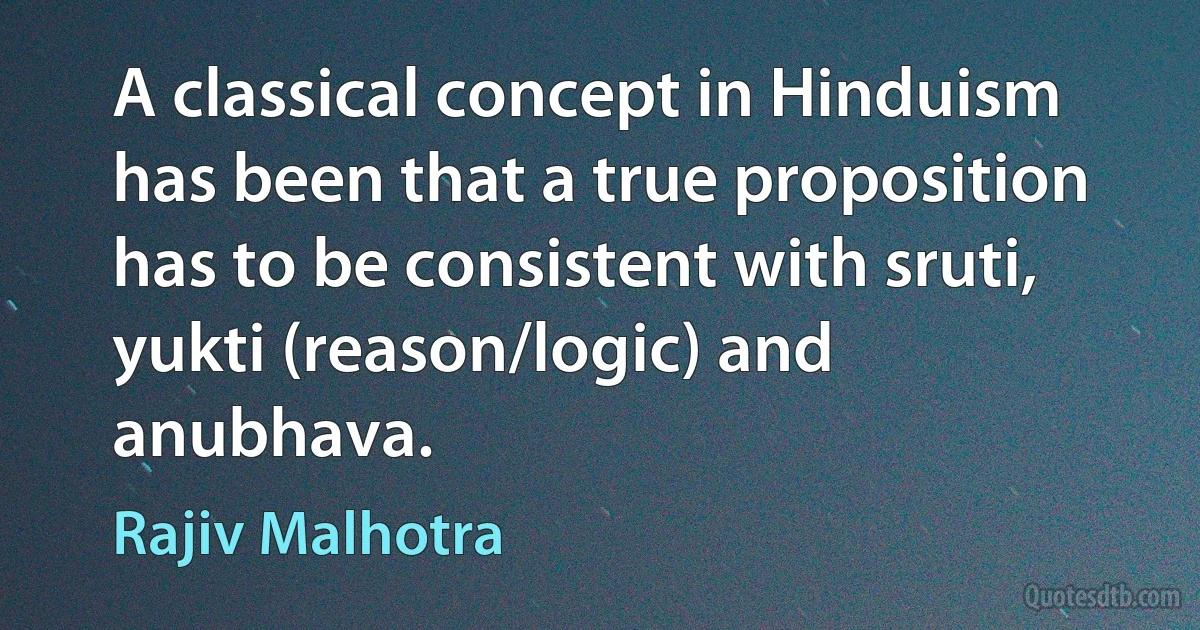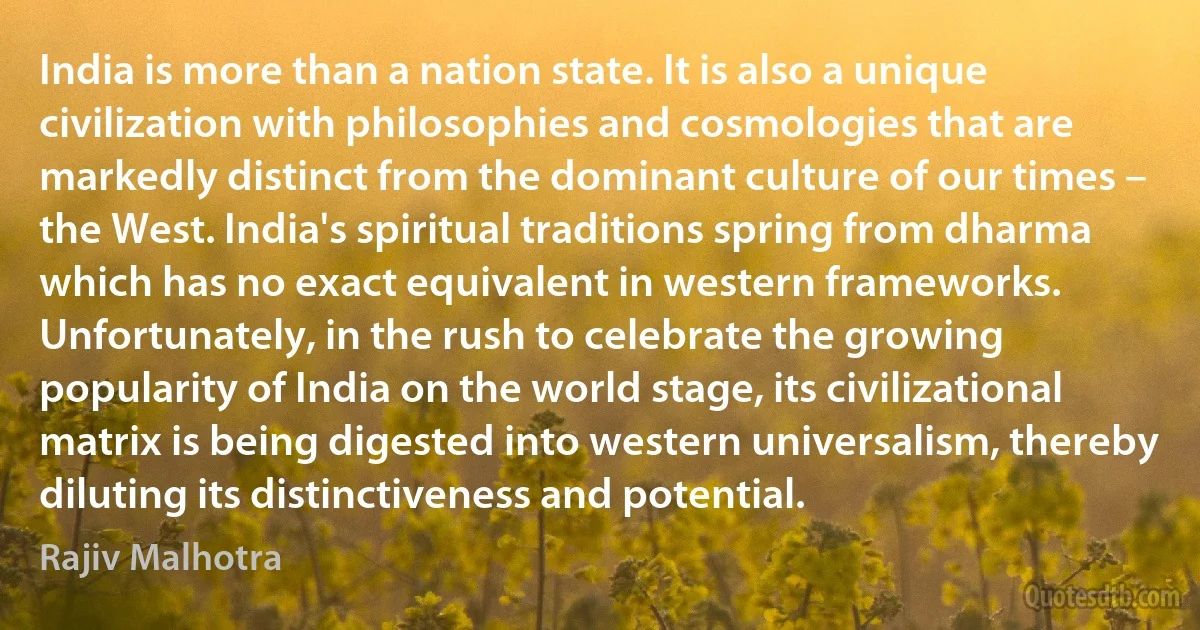Rajiv Malhotra quotes
[Indra's Net is a metaphor for] the profound cosmology and outlook that permeates Hinduism. Indra's Net symbolizes the universe as a web of connections and interdependences [...] I seek to revive it as the foundation for Vedic cosmology and show how it went on to become the central principle of Buddhism, and from there spread into mainstream Western discourse across several disciplines.

Rajiv Malhotra
For the first time in RISA's history, to the best of my knowledge, the diaspora voices are not being branded as saffronists, Hindutva fanatics, fascists, chauvinists, dowry extortionists, Muslim killers, nun rapists, Dalit abusers, etc. One has to wait and see whether this is temporary or permanent.

Rajiv Malhotra
American Hinduism is a minority religion in America (...) that deserves the same treatment that is already being given to other American minority religions – such as Native American, Buddhist or Islamic – by the Academy. The subaltern studies depiction of Hinduism as being the dominant religion of India must, therefore, be questioned in the American context.

Rajiv Malhotra
This is why the mainstream Western academics does not teach Abhinavagupta, Aryabhata, Bharata, Bhartrihari, Shankara, Kalidasa, Kapila, Kautilya, Nagarjuna, Panini, Patanjali and Ramanuja, among many other Indian greats on par with the great Greek thinkers. This violates the principle that the classical thinkers of all civilizations ought to be incorporated into curricula based solely on their merit and current relevance.

Rajiv Malhotra
For Pollock, the fact that [...] have written about Ayodhya, Mount Meru, Ganga, etc., in multiple locations is dumbfounding and irrational..... I propose a different interpretation of the same data. As per our tradition, the conceptual space of Hindus can be replicated and localized easily. The Hindu metaphysics of immanence leads to the decentralization of sacred geography.... This is why people in south India substitute their local rivers for Ganga for ritualist purposes; there is a town called Ayodhya in Thailand; the cognitive landscape of people in Java started to include Mount Meru as a local place, and so on.

Rajiv Malhotra
He sidesteps the rise in the funding of Persian and Arabic by the secular Indian government and by foreign sponsors, and the concurrent dramatic decline in Sanskrit funding. He does not expose the downsizing and dismantling of the institutions, both formal and informal, on which Sanskrit and sanskriti have traditionally thrived. Pollock is careful not to implicate the non-Hindu forces that have wreaked havoc against Sanskrit.

Rajiv Malhotra
Although he sees this process as politically driven, Pollock does acknowledge there were no conquering Sanskrit legions that caused Sanskritization, unlike the coercive Romanization which followed Roman military legions. Nor was there a central church-like religious institution and hence no evangelism that could have Sanskritized through religious conversion. He admits that the notion of the Sanskrit cosmopolis does not fit the Western notion of an empire.

Rajiv Malhotra
I wish to also point out that Dr Ambedkar, the pioneering Dalit leader, had worked zealously to promote Sanskrit. A dispatch of the Press Trust of India dated 10 September 1949 states that he was among those who sponsored an amendment making Sanskrit, instead of Hindi, the official language of the Indian Union.

Rajiv Malhotra
If a scholar were to refute the very existence of Allah..... it would be called Islamophobia. .... An analogous situation exists in the way an attiutde gets classified as anti-Semitic. Hindus should be alarmed by the existence of a double standard in Western academics, because the same sensitivity and adhikara to speak for our tradition is not granted to Hindus. ..... We need to define a level playing field for characterizing a work as Islamophobia, anti-Semitism, Hinduphobia, etc.

Rajiv Malhotra
Wilhelm Halbfass, the late Indologist at the University of Pennsylvania, took such ridiculous statements into strange, speculative areas and wrote: Would it not be equally permissible to identify this underlying structure as 'deep Nazism' or 'deep Mimamsa'? And what will prevent us from calling Kumarila and William Jones 'deep Nazis' and Adolf Hitler a 'deep Mimamsaka?

Rajiv Malhotra
He then goes a step further and briefly imposes a Freudian reading on the text, a reading outdated and crude even in the current Western context of cultural criticism. He says the depiction of 'the other' in Ramayana can be understood as a projection of the unfulfilled sexual desires of traditional Indians. .... The motive of applying a totally alien framework, viz., the Freudian one, to a traditional Hindu text is something that is questionable.

Rajiv Malhotra
...acting on Hacker's wishes, the editor of his collected works excluded the author's polemical Christian writings from the compilation. ... Many such polemical writings also appeared in fringe religious pamphlets and propaganda literature which are unknown to most scholars.... Hacker's suppression of this material compromised his integrity as an objective scholar, as it misled readers into thinking his writings on Hinduism were objective evaluations when in fact they were, in Andrew Nicholson's words, the work of a 'Christian polemicist'. In his posthumously published wrigings, Hacker is as explicit in his support for Christianity as he is in his attack on contemporary Hinduism.

Rajiv Malhotra
In the Mahabharata, the ceremony for the oath of a new king includes the admonition: 'Be like a garland-maker, O king, and not like a charcoal burner.' The garland symbolizes social coherence; it is a metaphor for dharmic diversity in which flowers of many colors and forms are strung harmoniously for the most pleasing effect. In contrast, the charcoal burner is a metaphor for the brute-force reduction of diversity into homogeneity, where diverse living substances are transformed into uniformly lifeless ashes.

Rajiv Malhotra
One of his [Pollock's] goals is to critique and expunge what he sees as deeply entrenched static social hierarchies, barbarisms and poisons. I do not see anything inherently wrong with this intention by itself; most Hindus welcome improvements and the evolution of their culture. The issue worth debating is that Pollock sees these ills as deeply rooted in the Vedas themselves and as requiring the abandonment of core metaphysical and sacred perspectives.

Rajiv Malhotra
Rajiv Malhotra

Photo:
Sparkume,
CC BY-SA 3.0
Occupation: Indian-American Entrepreneur
Born: September 15, 1950
Quotes count: 49
Wikipedia: Rajiv Malhotra



